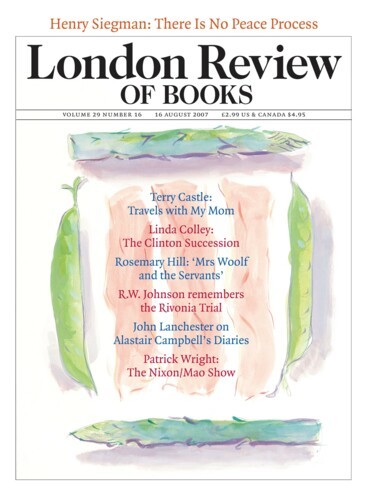David Lassman, the director of the Jane Austen Festival in Bath (Regency dress parade, bonnet-making workshops, ‘Tea with Mr Darcy’), submitted opening chapters and plot synopses of Austen’s novels to 18 British publishers and agents, changing just the titles and characters’ names. Lassman was ‘staggered’, he told the Guardian, when he received form letter rejections back. ‘If the major publishers can’t recognise great literature,’ he asked, ‘who knows what might be slipping through the net?’ Lassman admitted that he hadn’t yet been able to find a publisher for his own novel, a thriller.
Editorial assistants explained as patiently as they could that polite rejection letters are exactly what they’re supposed to send crackpots, not ‘Villain! Do you think I don’t know my Colin Firth?’ And even if they had rejected Austen’s novels not knowing who had really written them, Lassman’s experiment remains unrevealing: evaluation depends on context. A 21st-century reader, thinking that she’s reading work by a 21st-century writer, could well look at the opening of Sanditon – ‘A Gentleman and a Lady travelling from Tunbridge towards that part of the Sussex coast which lies between Hastings and Eastbourne, being induced by business to quit the high road and attempt a very rough lane, were overturned in toiling up its long ascent’ – and rule it out as pastiche: something trying too hard to sound like Jane Austen.
But none of this seemed to matter. As soon as Lassman went to the press, the story became about the stupidity of the publishing world, that this is a wretched time for literature: ‘Jane Can’t Get Published’; ‘Austen Scam Exposes Publishers’ Pride and Prejudice’; ‘No Takers for Jane Austen’; ‘Jane Austen? They’ll Pass’; ‘Is Anyone Surprised?’ It’s essentially the same story that ran in 1984, when Doris Lessing wrote two novels under pseudonyms to make the point that no one would notice them. Or last year, when the Sunday Times sent 20 literary agents chapters from old novels by V.S. Naipaul and Stanley Middleton. Cue outrage, embarrassment, ‘we receive 50 manuscripts a day – we do our best.’
Are publishers less perspicacious than they used to be? The first time a version of Pride and Prejudice, called ‘First Impressions’, was offered to a publisher, in 1797, it was rejected – no response but ‘declined by return of post’. A few years later, Austen tried again, sending Northanger Abbey to a different publisher, Richard Crosby. He paid £10 for it, but didn’t publish it. In 1810, Thomas Egerton agreed to publish Sense and Sensibility on commission: Austen paid for her own printing and some advertising, and it found its readers. But what if Egerton had been of the same mind as Crosby? Of if Austen hadn’t been able to raise the money? Would she have kept trying – like William Golding, submitting and resubmitting Lord of the Flies 22 times? Or, what if, once Austen’s novels were published, no one noticed them? Moby-Dick sold 3180 copies in Melville’s lifetime – only two copies were bought in 1876 – and went out of print; he went to work as Deputy Inspector No. 75 of the United States Custom Service. Posterity made it up to him. But what about when it doesn’t?
Many families are haunted by an unrecognised genius, the one who should have made it, and didn’t. In mine it’s my grandfather’s uncle, Sim. He left the Bronx to live in Berlin between the wars, changed his name to ‘Sinclair’, knew Archipenko, Tchelitchew and Judy Holliday (when she was a baby: her parents were Abe and Helen Tuvim), wrote (one article) for Vanity Fair. But no one would publish his poems. Shortly before he either killed himself or died in a car accident, he entrusted them to my grandfather – perhaps he would be able to get them published. But he couldn’t, and for years the poems were lost. My Uncle Chuck found them for me a few weeks ago. They were typewritten, the pages yellowed but tidy, in a black folder with the title ‘The Fool Complains’. I didn’t know the saying and had to look it up: ‘The silly when deceived exclaim loudly; the fool complains; the honest man walks away and is silent.’ My own Uncle Sim! I would publish them myself. Then: an edition, a complete edition. Conferences. Translations. A biography. But, on inspection, the poems didn’t stand up. They’re not embarrassing – just too indebted to T.S. Eliot.
Send Letters To:
The Editor
London Review of Books,
28 Little Russell Street
London, WC1A 2HN
letters@lrb.co.uk
Please include name, address, and a telephone number.

